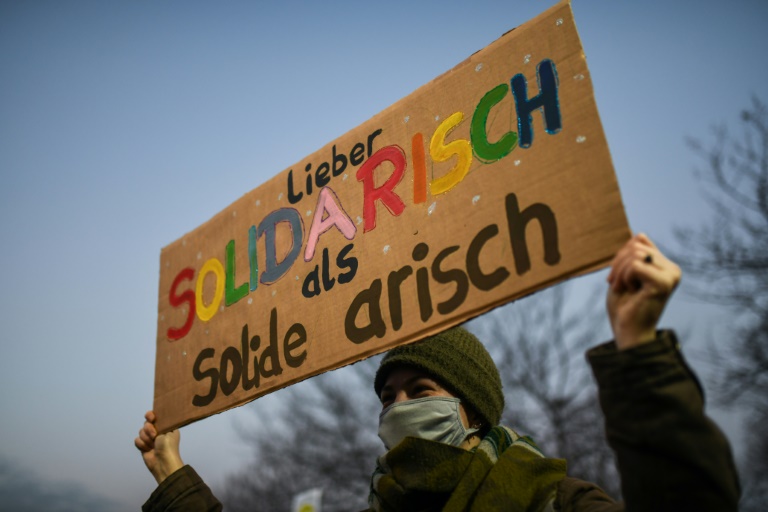
BERLIN – Hundreds of AfD delegates will gather Saturday for a congress that authorities have warned could become a coronavirus hotspot, as the German far-right party increasingly aligns itself with militants protesting coronavirus restrictions.
Six hundred members of the party are due to meet at an unused nuclear plant in western Germany’s Kalkar city to draw up their first concept on pensions.
To win approval for the huge gathering at a time when Germans are asked to limit their contacts to just two households at a time, the AfD had signed up to stringent rules including compulsory mask wearing and distancing in the huge hall.
The party’s own security officers are due to ensure that the rules are met, alongside officials from Kalkar city.
Hundreds of police officers will also be deployed to ward off any unruly scenes, as anti-AfD protesters have also announced plans to demonstrate outside.
The event can “become a hotspot,” warned Kalkar’s mayor Britta Schulz, adding that while it was “irresponsible” to hold such a big event, the political gathering could not be prohibited.
Because new appointments are also due to be made to the AfD’s board during the meeting, the congress is exempted from rules banning large gatherings in the state of North Rhine-Westphalia.
In contrast, Chancellor Angela Merkel’s CDU party has twice postponed its congress to elect a new leader because of the risks of coronavirus contagion. The Green party last weekend held their meeting online.
Shrugging off possible risks, the AfD’s health policy spokesman Detlev Spangenberg claimed: “The coronavirus is comparable to the influenza in terms of the course taken by the illness as well as in terms of its lethality. So the serious measures (taken to fight it) are not proportionate.”
Germany has recorded more than a million coronavirus infections. A total of 15,586 people have died from the illness, according to official data.
– ‘War propaganda’ –
The Alternative for Germany party has been the focus of repeated controversies since it began life as a eurosceptic outfit seven years ago.
In 2015, as public opinion soured against Chancellor Angela Merkel’s decision to keep Germany’s borders open to hundreds of thousands of people fleeing war in Iraq and Syria, the AfD morphed into an anti-immigration party.
It was rewarded for its Islamophobic positioning at elections in 2017, when voters sent it into the Bundestag for the first time to become the biggest opposition group in parliament.
A year ahead of national elections, the party is once again positioning itself at the side of militants railing against the government — this time over curbs imposed to battle the Covid-19 pandemic.
Party co-chief Alexander Gauland recently accused the government of using “war propaganda” to champion its “corona-dictatorship”.
AfD politicians are now also regularly marching side by side demonstrators against coronavirus curbs.
During the latest round of protests in central Berlin, when violence reached a level that the capital’s police chief said had been unseen in decades, an AfD politician was charged for using a forged medical certificate to claim he could not wear the required nose and mouth covering.
In a separate incident recently, Gauland was forced to apologise after two of the party’s lawmakers invited to parliament two far-right YouTubers who went on to harass politicians in the building.
Nevertheless, the AfD’s ratings have held at around 10 percent, compared to highs of 15-16 percent at the height of the migrant crisis.
Toxic infighting between ultra-conservatives and others in the party has weakened the AfD. Some voters are also turned off by association with neo-Nazi skinheads, as the AfD’s most radical faction “Fluegel” is now the object of official surveillance by Germany’s intelligence agency.
Instead, approval ratings for Merkel — who is due to retire from politics next year — have soared to new heights, as the vast majority of the population voiced satisfaction at her handling of the pandemic.


